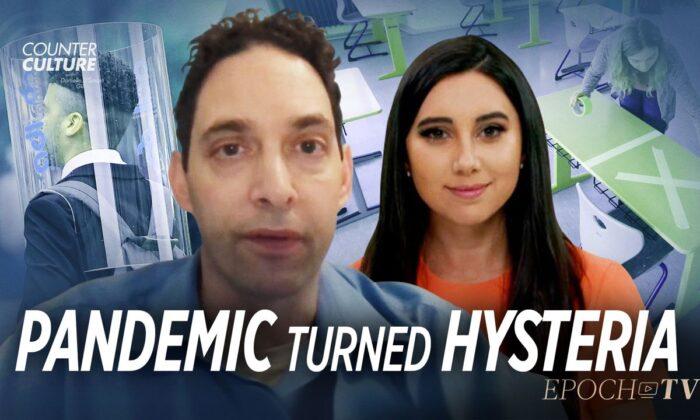A few weeks ago I was on Facebook and I saw a right-leaning friend post a list of six or seven policies that our current administration was enacting, so he could point out that every policy served no purpose other than to keep the plebs in their place. A left-leaning mutual friend of ours commented on the post, “What’s the source of this?” My right-leaning friend succinctly replied, “The news.” I laughed for about five minutes straight, as the only other option was to bang my head against the wall, wondering how our mutual left-leaning friend had missed any of these stories, given how important they are to the ordinary freedoms of, well, everyone.
Cindy Drukier’s first guest Asra Nomani is a former writer for the Wall Street Journal, vice president of the grassroots organization Parents Defending Freedom, an immigrant, and a parent in Fairfax County, Virginia. She has been dutifully making the rounds on every media outlet that will have her to discuss the recent decision by the DOJ to send the FBI after parents speaking out against objectionable curricula and policies at school board meetings. In June of 2020, Nomani began to speak up at school board meetings about the need to return to in-person learning; then against the activist teaching taking place at her son’s high school; then against the school board’s decision to drop merit-based enrollment; then eventually against critical race theory (CRT). She gives an overview of her experience confronting her school board, including showing a particularly shocking poster that was in one of the classrooms at her son’s school, all of which led her to band together with other mothers and found an organization to fight back.
Nomani moves on from the past to the present to talk about what prompted the National School Boards Association (NSBA) to go from cutting off parents’ time at the microphone to contacting the president of the United States, asking the feds to send in someone to arrest those pesky parents. This letter went out after a mother at a Fairfax County school board meeting dared to read from one book that has a pedophilia scene and then show graphic images from another book about being gender-queer; images that were blatantly pornographic. Both of the books were readily available in the school library. The school board, without a hint of self-awareness, demanded repeatedly that she stop speaking because it was inappropriate. The board then promptly declared a recess when parents began to boo their overt attempts to silence her free speech. After another week of parents protesting peacefully, if loudly and angrily, at school board meetings across the country, the NSBA went running to the government to protect them from.
Still, Nomani expresses her shock that Attorney General Merrick Garland actually took up the case, especially when he said he’d send in the FBI. Drukier reads off a list of articles referenced in the NSBA’s letter as “proof” that parents are one tense conversation away from building pipe bombs, but Nomani dismisses them out of hand. She points out that journalists frequently use inflammatory language to make it seem like there’s a fire where there isn’t even a quantifiable amount of smoke. Phrases like “sparks disruption,” “deputies called,” “mask protest,” and even “mob swarms school board meeting” all sound like parents show up to these meetings wielding pitchforks and torches. In reality, they show up with print-outs of actual copies of the curriculum that they were never supposed to know about, which is why the school boards are really afraid.
Because of her years as a journalist, Nomani knows to always follow the money, and as she explains there are an awful lot of lucrative contracts surrounding the introduction of CRT into classrooms. Nomani succinctly explains what CRT is, and every parent should listen so they know how this theory works and how schools are calling it by different names. School boards call their training seminars “anti-racist training” rather than CRT and are working it into classrooms through what is called praxis so they can claim with a straight face that they aren’t teaching CRT.
Unhappily for the school boards, they picked the wrong adversary. Drukier wants to know if parents really are some kind of looming physical threat to school board members, and Nomani assures her that’s not the case at all. Parents may be upset at these meetings, but there have been almost no instances of anything that could be defined as violence.
For Drukier’s second interview she brings on Paul Merski, Executive Vice President of the Independent Community Bankers of America, to discuss a new proposal about to be added to the $3.5 trillion budget bill. This proposal would give the IRS sweeping access to every American’s bank account. It would require banks to notify the IRS of any transaction totaling more than $600, which Treasury Secretary Janet Yellen claims will help the IRS hunt down tax evading billionaires. The IRS will also get $80 billion to hire 80,000 new IRS agents to track down these mythical billionaire tax cheats who are managing to make their money in $601 increments, as it’s the only way Yellen can think of that will allow the IRS to close a $7 trillion shortfall in revenue over the next 10 years.
Banks and businesses aren’t having any of this, with over 40 business associations writing to Congress to tell them this is insane. You know a proposal is bad when bankers are unequivocally on the same side as average citizens in opposing a government policy. That just doesn’t happen every day.
Merski explains the policy in a way that really anyone can understand. If your paycheck is more than $600, it will be reported at the time of deposit. If you got a check for $800 from your grandma for graduation, it will be reported when you deposit it in your bank account and when it comes out of her bank account. If your babysitting piggy bank is overflowing and you run to the bank to deposit the $632.25 you’ve earned throughout the year, it will be reported. This policy would apply to checking accounts, savings accounts, small business accounts, loans, and even moving money between accounts. Any transaction that involves more than $600 will get swept up in this dragnet.
Merski also mentions a $10,000 amount. There’s a pretty big difference between $600 and $10,000, the other amount being floated around for the proposal, but Merski quickly shoots down the idea that it’s in any way better. Anyone who hits the $10,000 threshold over the course of a year will still have their account information reported, including those making minimum wage, who will earn just over $15,000 a year if they work full time.
Since banks already provide information on interest they pay on accounts when it totals more than $10, Yellen says it should be easy enough just to tack two more pieces of information onto that report at the same time. Merski flatly refutes the implication that it wouldn’t take much more than an extra click or two in a computer system, saying that banks have nothing in place that could in any way track this amount of data. He also gets a bit of a dig in at the Biden administration’s claim that a $3.5 trillion budget bill is going to cost zero dollars, and states firmly and flatly that regardless of what Yellen says, this proposal means everyone’s banking information is going to be collected and sent to the IRS.
Since Merski is a banker, he can explain the kind of system banks would need to fulfill the IRS requirements. He rattles off the many ways people use banking such as people joining bank accounts when they get married, separating bank accounts when they divorce, handling multiple small business accounts, and checking and savings accounts that people routinely swap money between. Banks will have to invest billions just to track this information, buy new software and hardware, and hire new staff to ensure accurate reporting. Most of the information the IRS is going to get isn’t even going to be helpful and some of it will undoubtedly be in error.
As Merski further explains, this is a violation of the Fourth Amendment, with the federal government trying to use banks as a backdoor to poke around in Americans’ affairs without cause or obtaining a warrant. Drukier counters that Yellen claims their objective is to pursue “high-end non-compliance.” Merski dismisses this as nothing but a story, because an amount so low will catch literally everything from checking to savings to interest to loans. Merski outlines the many ways the IRS could come after anyone who ran afoul of them through this policy, from freezing accounts to subpoenaing the bank for more information.
It isn’t all doom and gloom just yet, however, as Merski gives the good news that a letter has already circulated among several state treasury departments stating that they will not comply if the proposal passes with the budget. He also mentions potential Fourth Amendment challenges, equating this kind of reporting to stop and frisk and the proposal requiring banks to act as a police force.
This episode handles a pair of topics that mesh well together as they both deal with ways the government is far overstepping its bounds in an attempt to control every aspect of Americans’ lives. It’s important to watch it and share it before the next crisis hits us and takes attention away from these issues. That means watch and share soon, as with our current administration, it’s a given that an even worse invasion of privacy or dampening of freedom is going to crop up any day now.
Follow EpochTV on social media:




